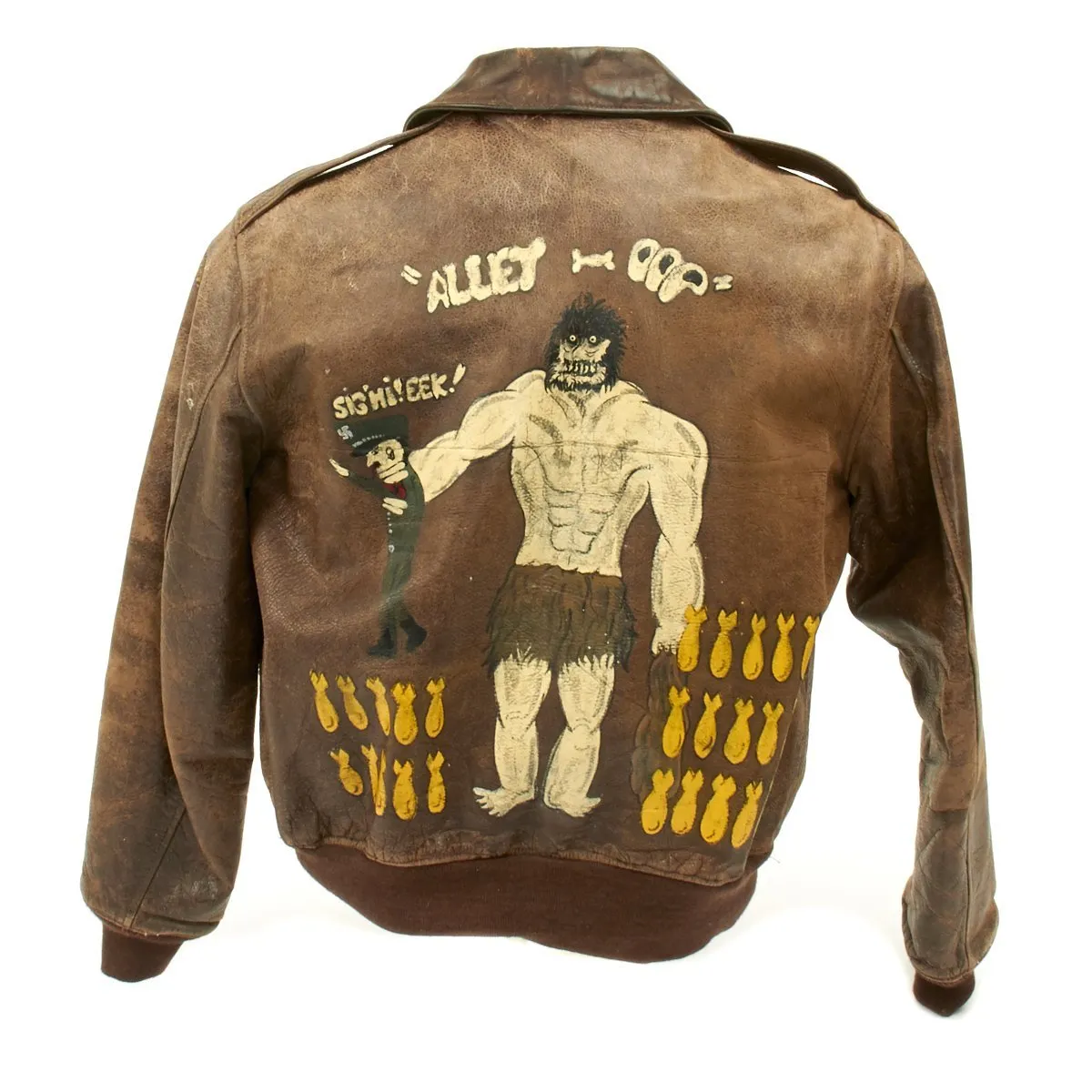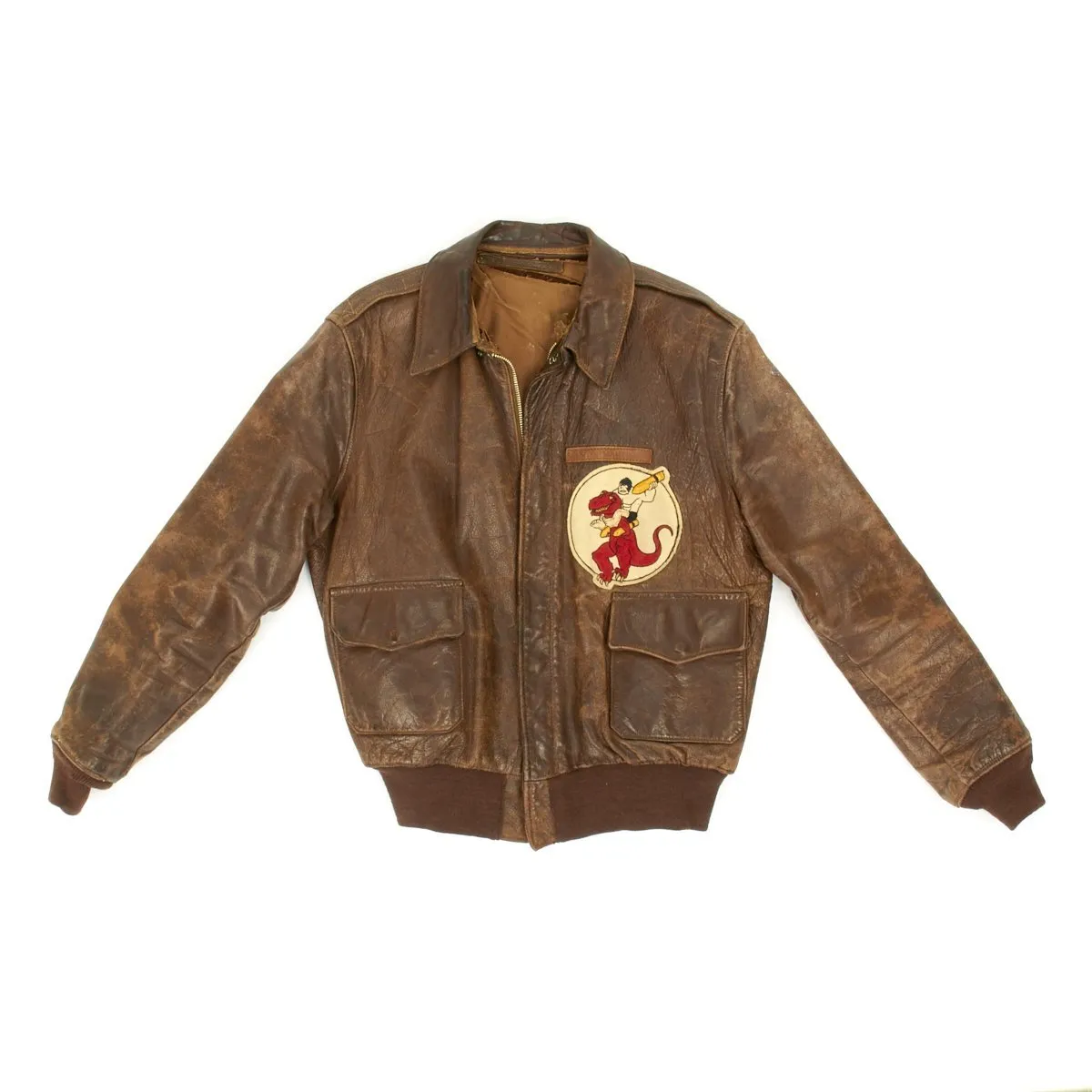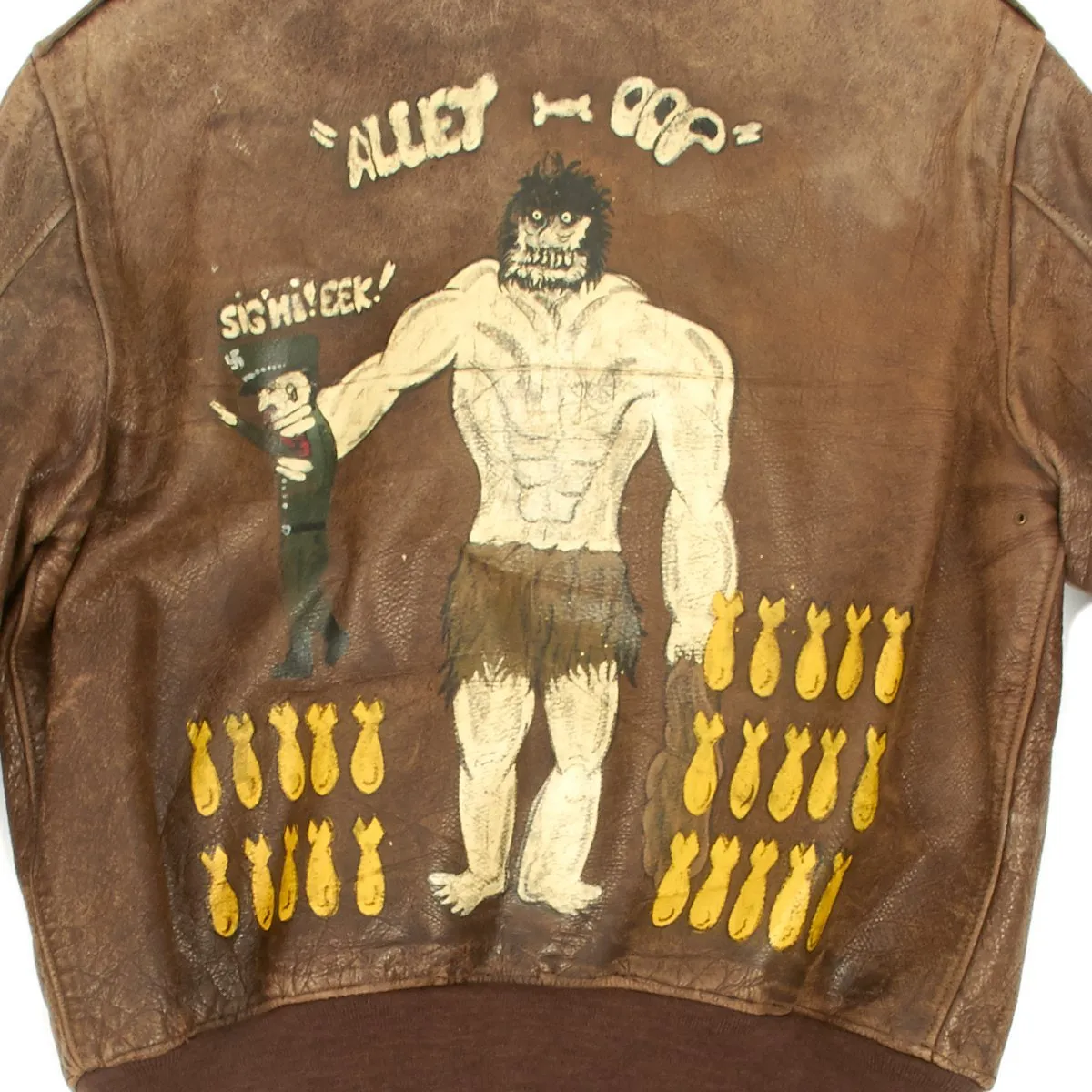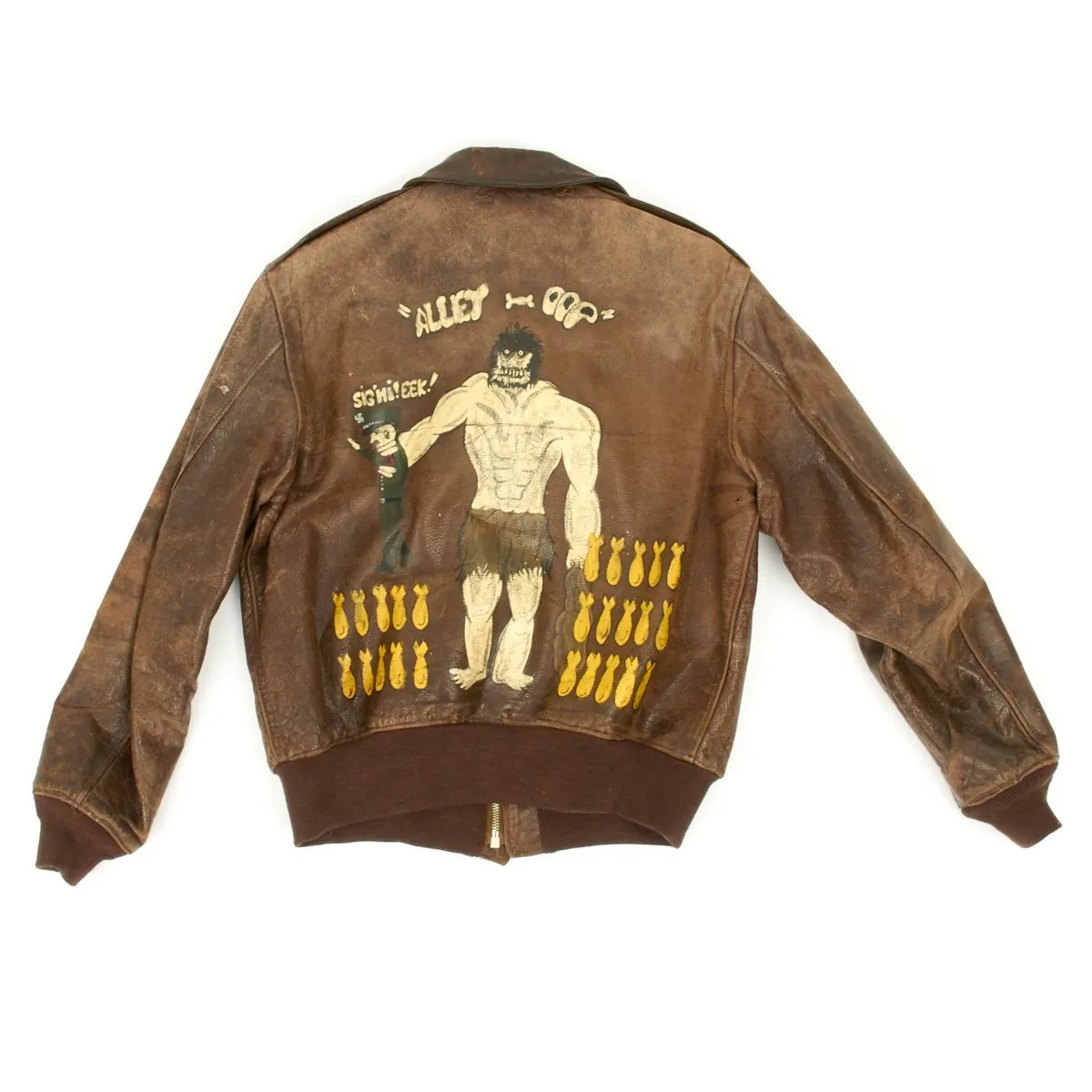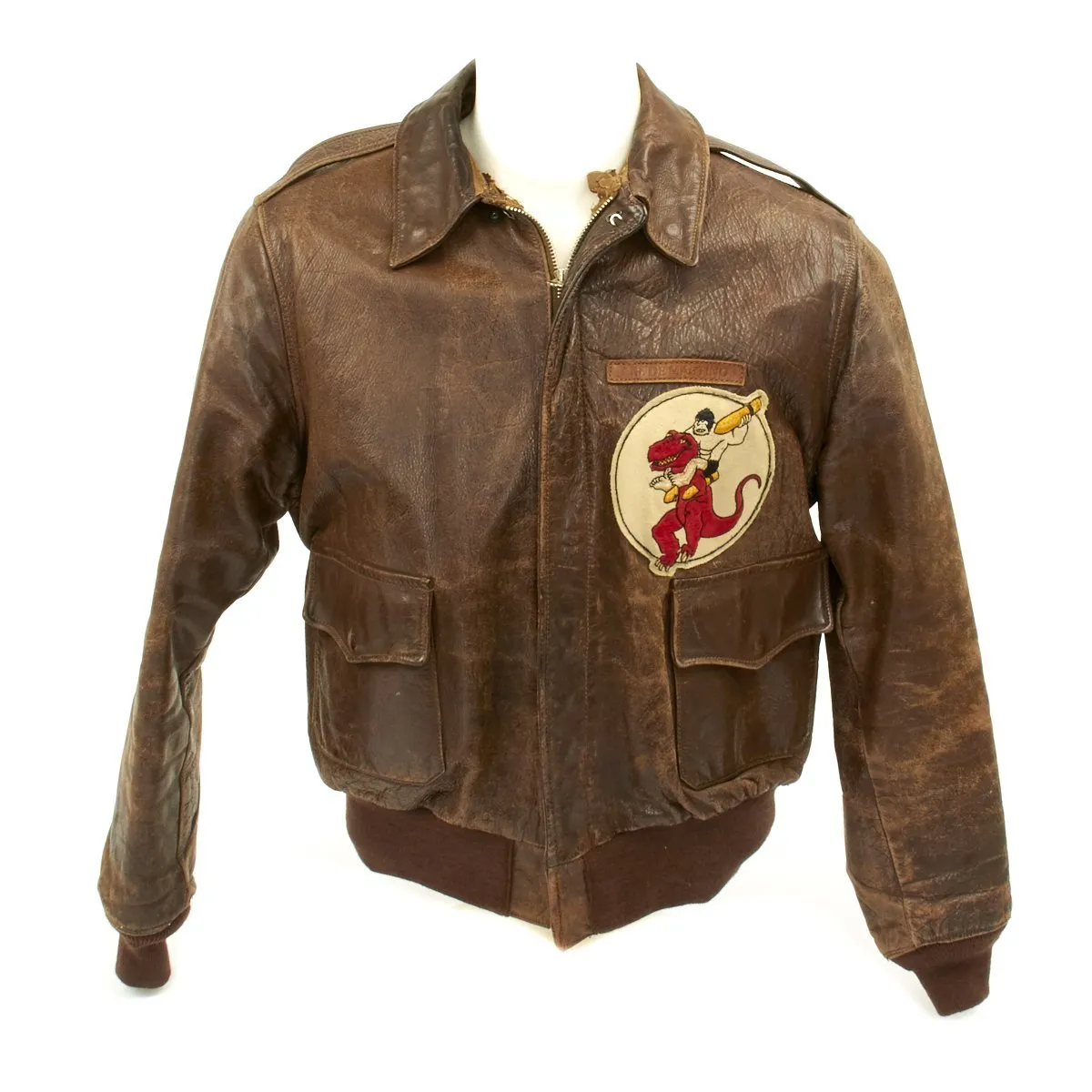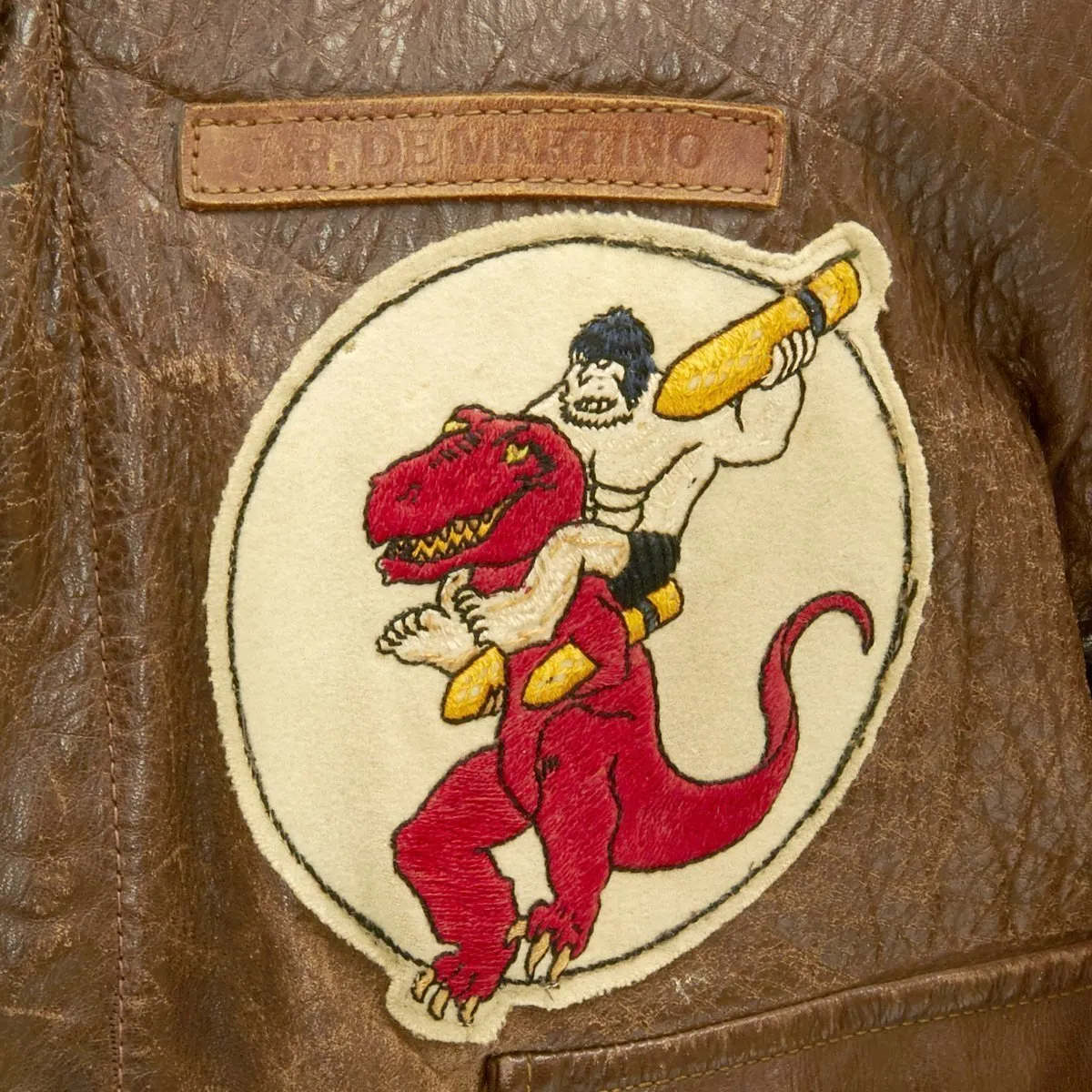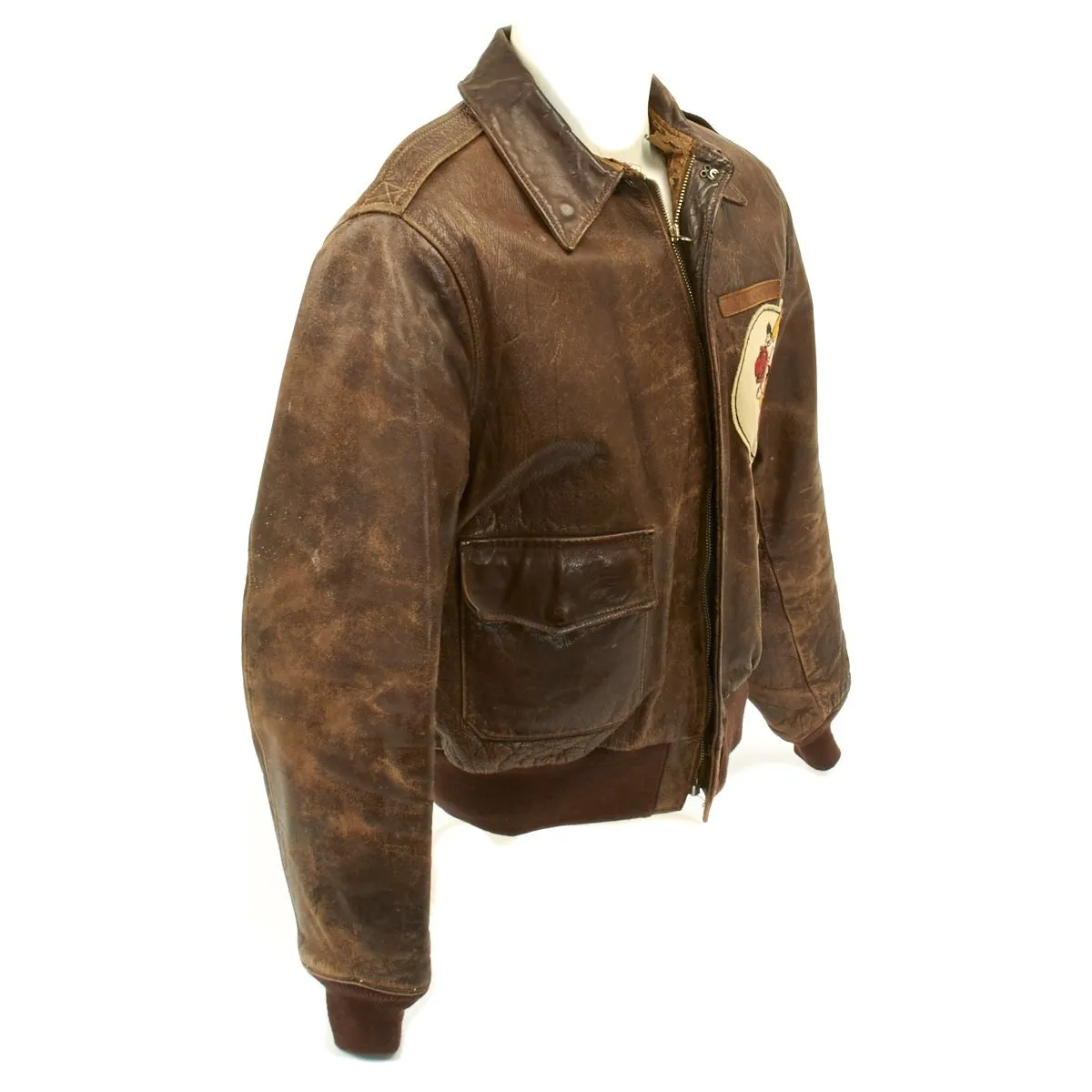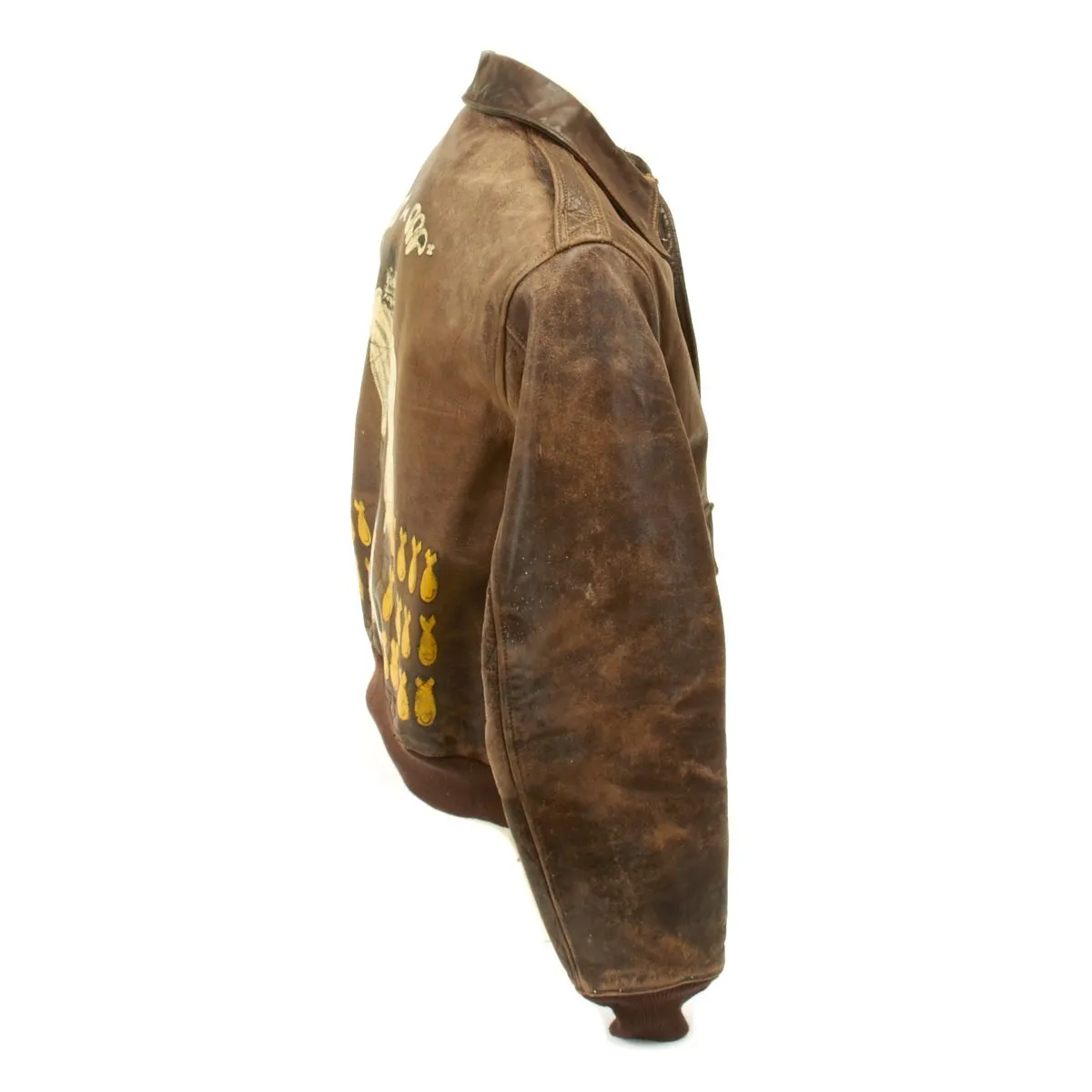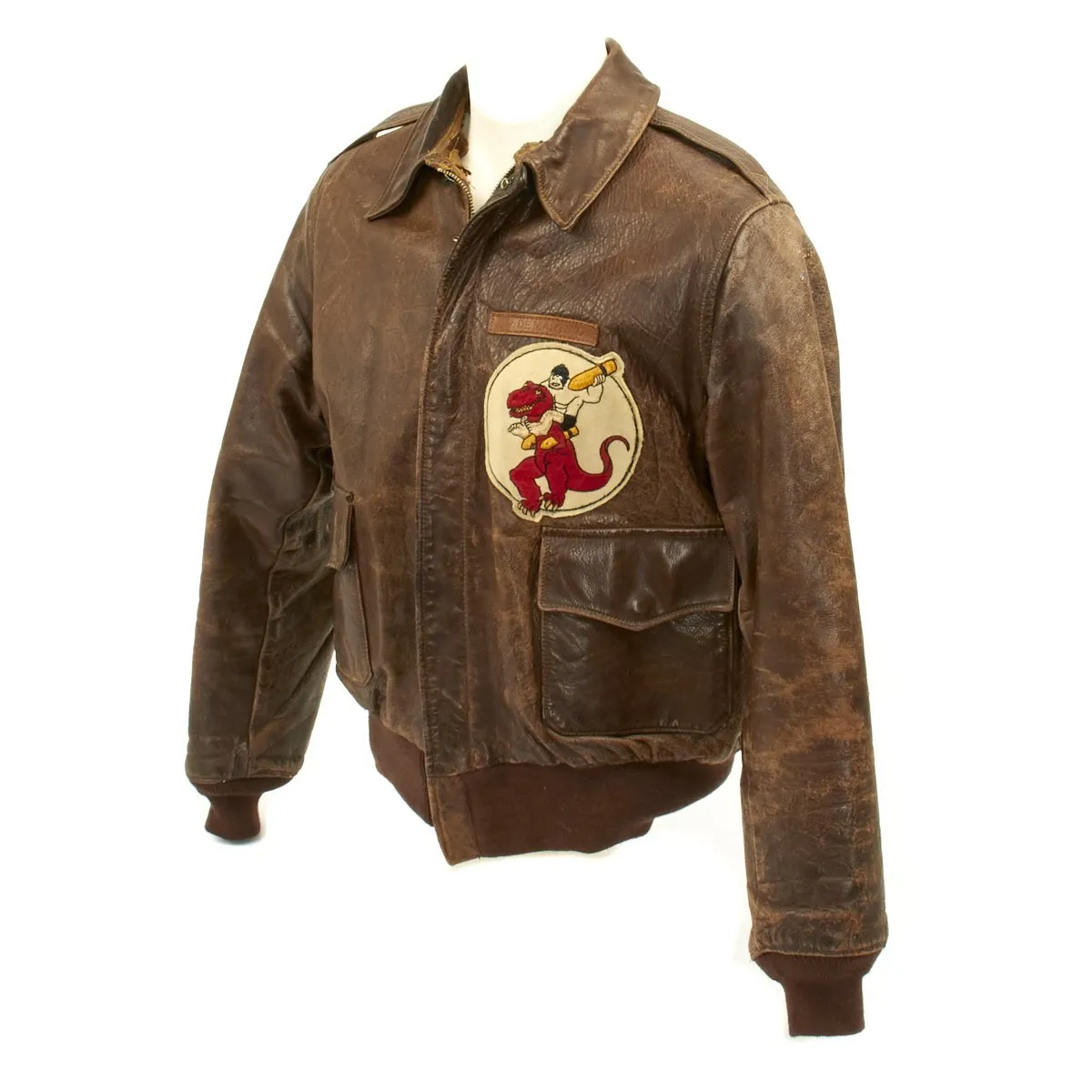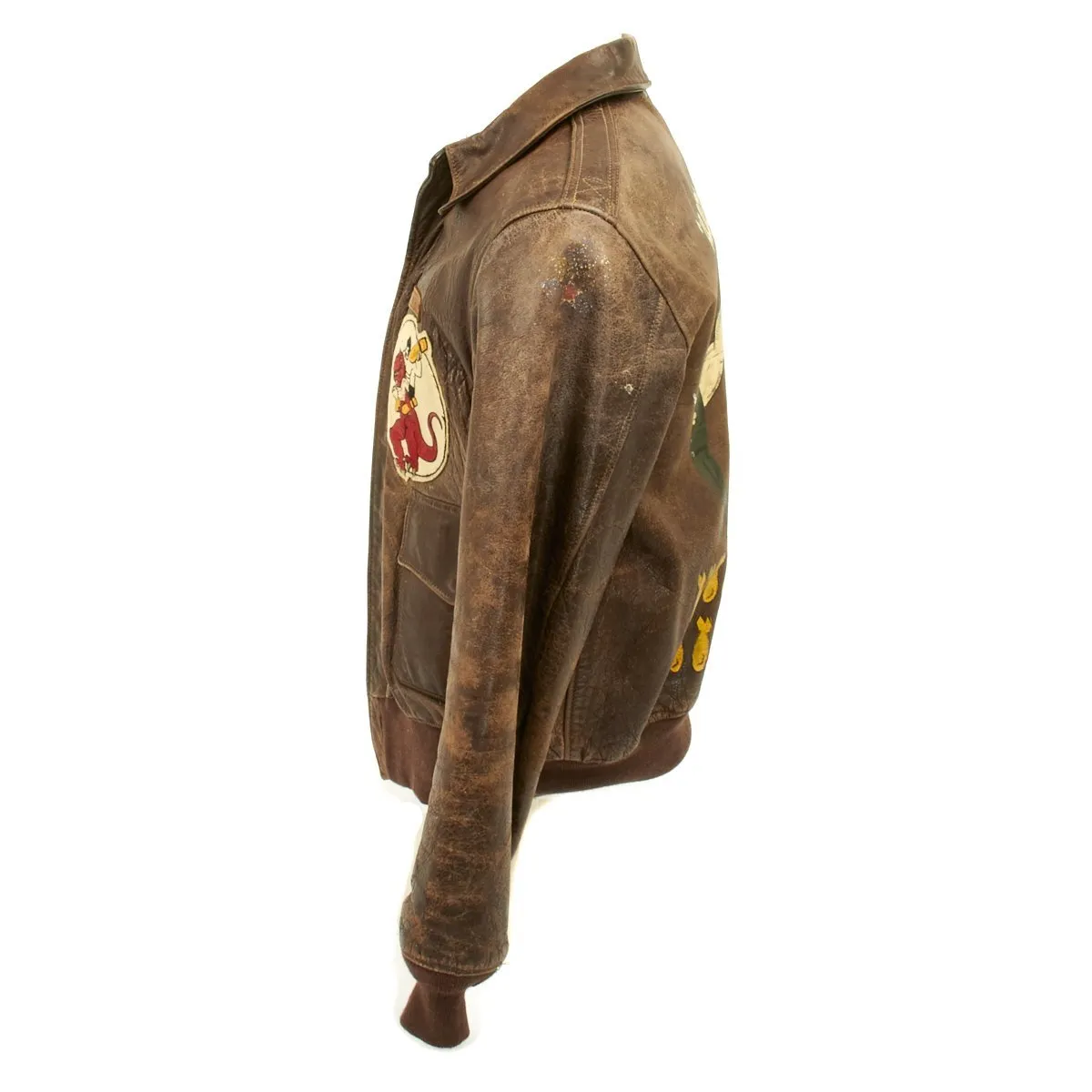Original Item: One-of-a-kind. This is an exceptional A2 leather flight jacket issued to a member of the crew of the B-17 Flying Fortress ALLEY - OOP. It is offered in very good condition in size 40.
The best aspect of this wonderful jacket is the hand painted ALLEY - OOP cartoon character (cave man) holding a club in one hand and strangling AH's neck in the other with 25 yellow bombs on the reverse of the jacket. Alley Oop was a syndicated comic strip created in 1932 by American cartoonist V. T. Hamlin, who wrote and drew the popular and influential strip through four decades for Newspaper Enterprise Association. Hamlin introduced an engaging cast of characters, and his story lines entertained with a combination of adventure, fantasy, and humor. Alley Oop, the strip's title character, was a sturdy citizen in the prehistoric kingdom of Moo. He rode his pet dinosaur Dinny, carried a stone war hammer, and wore nothing but a fur loincloth. He would rather fight dinosaurs in the jungle than deal with his fellow countrymen in Moo's capital and sole cave-town. Despite these exotic settings, the stories were often satires of American suburban life. The cartoon was popular with U.S. soldiers during WWII and became the "mascot" of the 327th Bomb Squadron.
The front of the jacket bears an embroidered insignia patch of the 327th Bomb Squadron. This patch is a RARE classic WWII United States Army Air Forces 327th Bomb Squadron, 92nd Bomb Group, 8th Air Force Alley Oop comic character. The English-made jacket patch that shows a tyrannosaurus rex carrying artillery under each arm and is embroidered in red, yellow, and black detail. A cave-man like character is riding on the rex’s back and wielding artillery. Measures approximately About 5" in width by 5-1/2" in height. Left shoulder of jacket has a painted 8th Air Force insignia (faded). The crewman's leather name patch is still intact on the left chest and reads R.J. DE MARTINO.
Overall condition of the jacket is very good. There is some minor wear in places and some paint loss to the 8th AAF insignia. The liner is original and cuffs appear to be correct replacements and it has a a complete functional TALON zipper.
The 327th Bombardment Squadron Activated as a B-17 Flying Fortress heavy bomb squadron in early 1942; trained by Third Air Force in the southeastern United States. As part of its training program, the Squadron flew anti-submarine operational missions. Deployed to European Theater of Operations (ETO), being assigned to VIII Bomber Command in England, one of the first squadrons being assigned to the command.
Initially assigned to RAF Bovingdon, squadron exchanged B-17Fs with the 97th Bombardment Group's B-17E aircraft. The 97th BG would move to North Africa and assigned to Twelfth Air Force as part of the Operation Torch landings. At Bovington, The squadron was directed to set up and operate the 1/11 CCRC (Combat Crew Replacement Center). The Squadron flew four combat missions beginning on 6 September 1942.
Moved to RAF Alconbury in January 1943 to re-equip, fly support missions to North Africa and train for combat. The 327th became the only to be equipped with the experimental Boeing YB-40 Fortress gunship from May through August 1943. The YB-40 was the bomber escort variant of the Flying Fortress, where the Y stood for "service test". It was developed to test the escort bomber concept for B-17 daylight bomber forces which were suffering appalling losses in their raids against German targets on the European continent.
Because there were no fighters capable of escorting bomber formations on deep strike missions early in World War II, the USAAF tested heavily armed bombers to act as escorts and protect the bomb-carrying aircraft from enemy fighters. Twelve of the 22 B-17F bombers modified to the YB-40 configuration were dispatched to Alconbury for testing and evaluation.
The first operational YB-40 sortie took place on 29 May 1943 against U-boat Sub pens at Saint-Nazaire, France.
Very early on, it was found that the net effect of the additional drag of the turrets and the extra weight of the guns, armor, and additional ammunition was to reduce the speed of the YB-40 to a point where it could not maintain formation with the standard B-17s on the way home from the target once they had released their bombs. The YB-40 could protect itself fairly well, but not the bombers it was supposed to defend. Consequently, it was recognized that the YB-40 project was an operational failure, and the surviving YB-40s were converted back to standard B-17F configuration or used as gunnery trainers back in the States. Squadron ended YB-40 operations on 29 July 1943. Was non-operational until 15 September 1943.
Re-equipped with operational B-17Gs and moved to RAF Podington on 15 September 1943. Began long-range strategic bombardment missions, primarily over Germany and resulted immediately in heavy losses. One of these missions was flown on Thursday, 14 October 1943, against the ball bearing plants at Schweinfurt. For what was to become a famous mission called "Black Thursday".
Some of the notable successes of the squadron included missions against German troop contingents in Normandy after D-Day. On 24 July 1944, the Squadron participated in a raid that virtually destroyed the elite "Panzer Lehr" armored division outside St. Lo. Artillery positions were wiped out, tanks overturned and buried, infantry positions flattened and all roads and tracks destroyed.
Another notable success was a raid against the virtually indestructible German submarine pens at IJmuiden. Using experimental rocket-propelled bombs, the Squadron destroyed these pens in a single raid after hundreds of conventional bombs dropped in earlier raids had failed.
The Squadron flew its last mission of the Second World War on 25 April 1945. By the end of the war against Germany, the group had flown over 300 combat missions, 154 aircraft missing in action and more than 150 returned with battle damage that it would not fly again.




